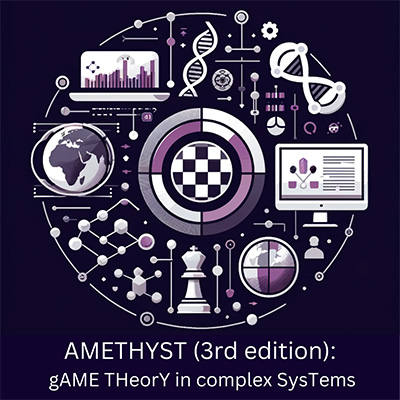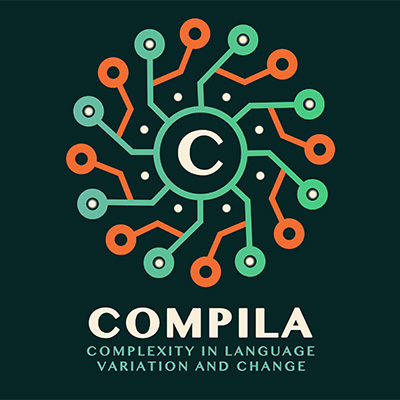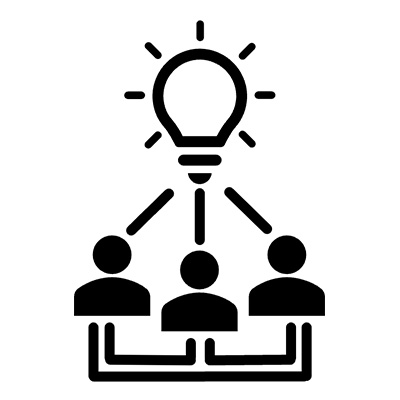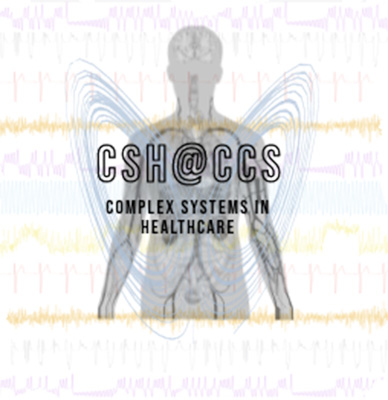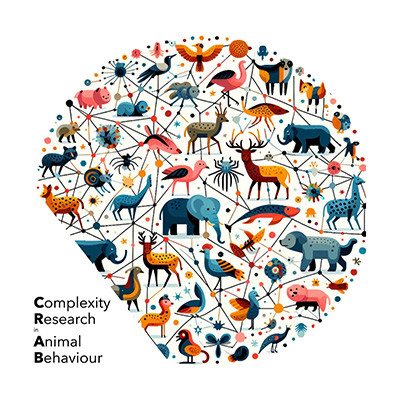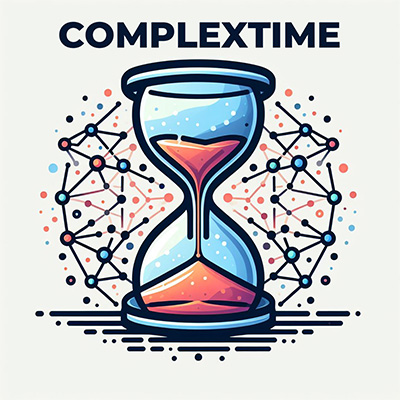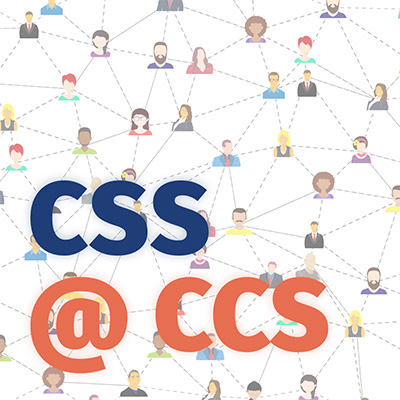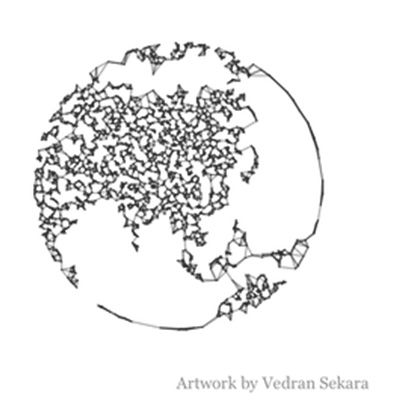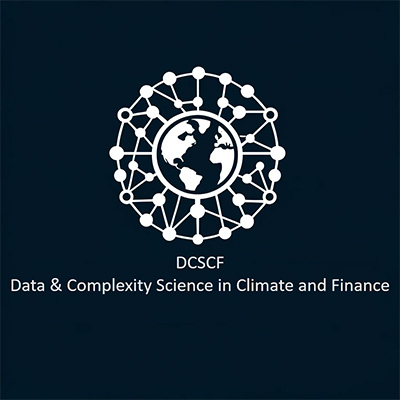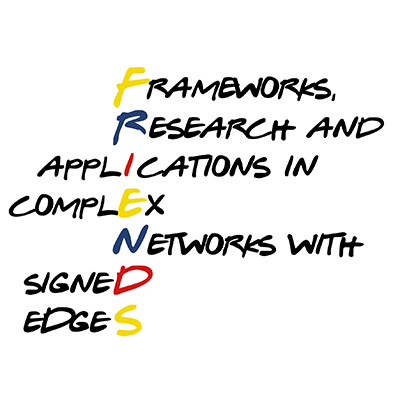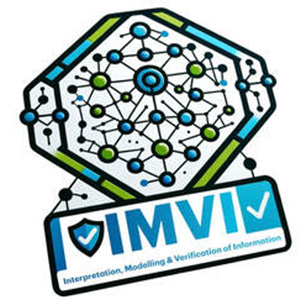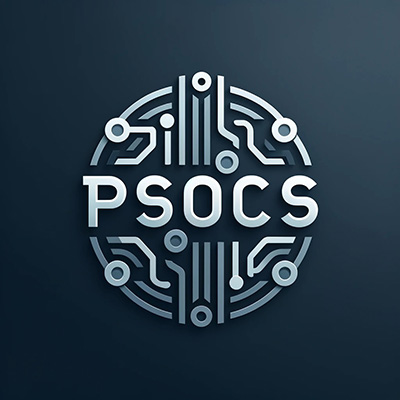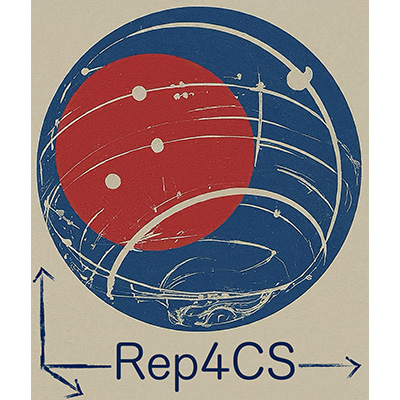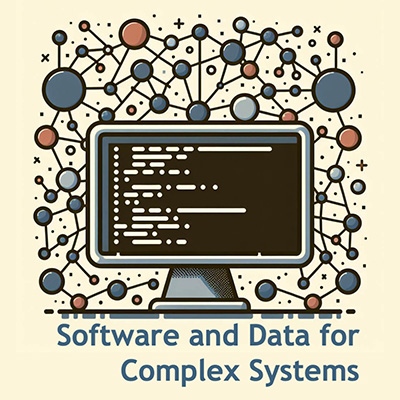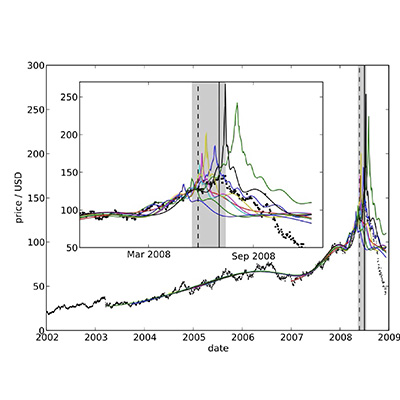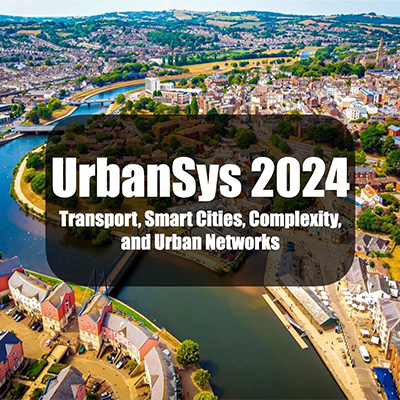Satellites Meetings
Here the list of the 24 selected satellites meetings that will run during the conference please check on each satellite website for more information!
Full Day Satellites – 6 hrs, Half Day Satellites – 3 hrs.
AMETHYST: gAME THeorY in complex SysTems
Alberto Antonioni, Alessandro Di Stefano, The Anh Han, Rashid Ibrahimli, Chiara Mocenni, Sofia Teixeira.
AMETHYST gathers scholars using game-theoretical methods in complex systems. The satellite emphasizes interdisciplinary collaboration, offering tools for addressing diverse research challenges, particularly in human behavior and empirical studies.
2nd Sept. – FULL DAY SATELLITE
COMPILA2024 – Complexity in Language Variation and Change
Marco Patriarca, Els Heinsalu, David Sanchez, Richard Blythe.
COMPILA2024, a satellite of CCS2024, is focused on the study of Language as a complex adaptive system with methods of dynamical systems and statistical mechanics. We expect all participants to engage in stimulating discussions about language complexity, variation, and change.
3rd Sept. – FULL DAY SATELLITE
Complex Systems and Collective Intelligence
Seth Bullock, Hywel Williams, Nirav Ajmeri, Mike Batty, Michalea Black, Cangxiong Chen, John Cartlidge, Maggie Chen, Joan Condell, Leon Danon, Adam Dennett, Alison Heppenstall, Phil Morgan, Aisling O’Kane, Laura Smith, Theresa Smith.
How can complexity science help us achieve collective intelligence in domains such as healthcare, finance, cities, pandemics and the environment? This satellite combines research talks, discussion panels and invited keynotes + explains how you can win funding from the AI4CI Hub’s research fund.
2nd Sept. – FULL DAY SATELLITE
Complex Systems in Healthcare: Models, Prediction, and Innovation
Sandip V George, Victoria Volodina.
Recent advancements in digital health have underscored the need for interdisciplinarity. We aim to bring together researchers employing different methods from complexity science in the context of healthcare, to identify pitfalls, potential solutions and foster interdisciplinary collaborations.
3rd Sept. – HALF DAY SATELLITE
Complexity in Economics & Finance – FINECONETS
Paolo Barucca, Giulio Cimini, Aurelio Patelli, Angelica Sbardella.
The “fineconets” workshop returns for the 11th edition at CCS2024. The aim is to bring together researchers active in the study of complex systems in economics and finance to discuss state-of-the-art research, share knowledge across disciplines and create collaboration opportunities.
3rd Sept. – FULL DAY SATELLITE
CRAB – Complexity Research in Animal Behaviour
Josefine Bohr Brask, Iacopo Iacopini, Matthew Silk.
Animal groups exhibit emergent behaviour linked to ecological and evolutionary processes. While complex systems approaches are used, interdisciplinary collaboration remains limited. The Complexity Research in Animal Behaviour (CRAB) satellite will allow cross-disciplinary exchange at this interface.
3rd Sept. – HALF DAY SATELLITE
ComplexTime – Temporal aspects in complex systems
Cheick T. Ba, Naomi Arnold, Richard G. Clegg, Istvan Kiss, Manuel Dileo.
The “ComplexTime” satellite workshop aims to explore temporal dynamics in complex systems across various domains. From temporal data handling to methods and tools, we invite submissions on topics such as temporal network analysis and mining, network models, and machine learning applications.
2nd Sept. – HALF DAY SATELLITE
Computational Social Science
Gerardo Iñiguez, Thomas Louf, Gabriele di Bona, Matteo Serafino.
This satellite (one of the oldest series of CCS, active since 2013) addresses social phenomena emerging over multiple scales, ranging from the interactions of individuals to the emergence of self-organized global movements within the realm of computational social science.
3rd Sept. – FULL DAY SATELLITE
Criminal Complexity – The complex nature of criminal activity
Rafael Prieto-Curiel, Cecilia Meneghini, Toby Davies, Ronaldo Menezes.
Crime is a multifaceted issue, and is the result of interactions between groups of offenders, between offenders and victims, and with the environments, economies and societies in which crime takes place. This workshop will explore the insights that can be gained using complexity and networks.
3rd Sept. – FULL DAY SATELLITE
CS4V24 – Complex Systems for the Most Vulnerable
Elisa Omodei, Manuel García-Herranz, Daniela Paolotti, Vedran Sekara, Michele Tizzoni.
Complexity plays a crucial role in tackling societal challenges. This Satellite aims both at showcasing the most relevant work produced by the Complex Systems community in this area, and at focusing its attention on the pressing issues affecting the most vulnerable populations.
2nd Sept. – FULL DAY SATELLITE
DCSCF – Data & Complexity Science in Climate and Finance
Giuseppe Brandi, Tiziana Di mAtteo.
Financial markets and climate systems are complex dynamical systems that generate large datasets with emerging patterns. This workshop aims to explore these systems through complexity and data science, uncovering latent patterns and offering deeper insights by leveraging different methodologies.
2nd Sept. – FULL DAY SATELLITE
EPINEXT – Next-gen Methods for Data-rich Epidemic Models
This satellite explores methodological and theoretical advances in epidemic modeling. It emphasizes approaches enhancing the integration of various data sources. It covers many approaches: complex systems, statistical physics, network analysis, statistical inference and machine and deep learning.
3rd Sept. – HALF DAY SATELLITE
Ergodicity and the economics of sustainability
Emilie R. Soysal, Oliver Bettis, William Hynes, Ole Peters, Colm Connaughton.
Climate tipping points, irreversible environmental damage, and extinction risk are signs of ergodicity breaking – a central theme in complexity theory. This multidisciplinary satellite explores the importance of ergodicity breaking for the analysis of ecosystem services and sustainability.
3rd Sept. – FULL DAY SATELLITE
FRIENDS – Frameworks, Research and applIcations in complEx Networks with signeD edgeS
Andreia Sofia Teixeira, Elena Candellone, Miguel Ángel González Casado, Fernando Diaz Diaz, Irene Ferri, Emma Fraxanet, Antoine Vendeville.
FRIENDS will address the unique properties of signed networks, i.e. networks containing positive and negative links. Between invited speakers and contributions, we will explore the latest mathematical models, novel network metrics and implications of this framework in diverse scientific fields.
2nd Sept. – FULL DAY SATELLITE
IMVI – workshop on Interpretation, Verification and Modelling of Information
Ronaldo Menezes, Diogo Pacheco.
Join us as we build fruitful discussions in this inaugural event to develop innovative solutions to combat misinformation effectively. This event is being organised in collaboration with the Alan Turing Institute Special Interest Group on the Interpretation, Modelling and Verification of Information.
2nd Sept. – FULL DAY SATELLITE
MIMODE – Mobility and migration research in the digital era
The aim of MIMODE is to bring together researchers from different fields from around the world to facilitate a conversation on the use of innovative digital data sources, new methodologies, empirical findings, and critical challenges of studying migration and mobility in the digital era.
3rd Sept. – FULL DAY SATELLITE
MODIS 2024 – How to build digital public spaces: Modelling, Data analysis, and qualitative approaches
Sven Banisch, Michael Mäs, Eckehard Olbrich.
The workshop will explore current methodologies and future directions for theoretically grounded and empirically supported analyses of the impact of social media on public discourse. Furthermore, we will discuss potential (re)designs of social media platforms to mitigate undesirable social dynamics.
3rd Sept. – FULL DAY SATELLITE
MIXNEXT – Multiscale & Integrative compleX Networks: EXperiments & Theories
Oriol Artime, Valeria d’Andrea, Marco Grassia, Tomas Scagliarini, Manlio De Domenico.
This Satellite deals with advances on the multiscale organization of complex networks. It aims to trigger new discussions on how to build a more comprehensive set of tools integrating different perspectives into a coherent and self-consistent framework for multiscale network modeling and analysis.
2nd Sept. – HALF DAY SATELLITE
Physics of Self-Organization in Complex Systems
We continue the direction of the work of scientists such as Lars Onzager, Ilya Prigogine, and Herman Haken. We explore self-organizing principles that operate across various scales, from subatomic particles to cosmic phenomena and all intermediate scales.
3rd Sept. – FULL DAY SATELLITE
Rep4CS – Representation Learning for Complex Systems
Sadamori Kojaku, Dakota Murray, Hiroki Sayama.
Data about complex systems are rich and diverse yet often encoded as excessively simplified representations. This satellite aims to shift from simple to more detailed and nuanced data representations, including geometric and topological representations of networks, text, and image data.
2nd Sept. – HALF DAY SATELLITE
SDCS – Software and Data for Complex Systems
Naomi Arnold, Cheick Tidiane Ba, Richard Clegg, Alessia Galdeman, Matteo Zignani.
The SDCS satellite aims to shift the focus away from results and onto the tools for complex systems, including software packages and open datasets. This will be a unique venue for software/data creators to showcase their tools, and for practitioners to find tools to support their research.
3rd Sept. – HALF DAY SATELLITE
Third workshop Criticality on networks and socio-economic systems
The goal of this satellite is to open cross-disciplinary discussions about
the concept of criticality. How can we define criticality in different
scenarios? And which signs of criticality have been reported in the
scientific literature.
2nd Sept. – HALF DAY SATELLITE
UrbanSys2024 – Transport, Smart Cities, Complexity and Urban Networks
Elsa Arcaute, Marc Barthelemy, Matteo Bruno, Riccardo Gallotti, Marta Gonzalez, Andrea Guizzo, Vittorio Loreto, Mattia Mazzoli, Hygor Piaget Monteiro Melo, Jose Javier Ramasco.
UrbanSys2024 invites contributions studying the city as a complex system, from a citizen’s behaviour to the evolution of a whole city, data-driven approaches help model and gain insight into urban systems. Mobility, accessibility, inequality and scaling laws are among the topics of this satellite.
2nd Sept. – FULL DAY SATELLITE

